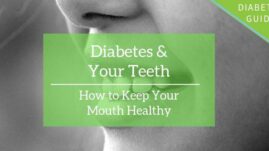If you have diabetes, you probably know that “fruity-smelling breath” is a common symptom of the disease.
Many of you may have had that sickly-sweet taste and smell in your mouth for weeks before getting a diagnosis.
But what many don’t know is that chronic bad breath, otherwise known as halitosis, and diabetes may go hand-in-hand, even years after first getting diagnosed.
So, what’s the connection between bad breath and diabetes?
This article will explore the relationship between the two conditions, what the causes are, and how you can prevent it from continuing in the future.

Why do people get sweet-smelling breath before a diabetes diagnosis?
The classic “fruity-smelling breath” before a diabetes diagnosis, especially a type 1 diabetes diagnosis, can be a sign of diabetic ketoacidosis, or DKA, which is a dangerous and potentially fatal condition in which your blood sugar is so high that your blood begins to turn acidic.
Many people experience this symptom before getting a diabetes diagnosis.
If you have fruity-smelling breath, accompanied by the other following symptoms, you should call your doctor’s office or seek emergency medical help immediately to be tested for diabetes:
- Dry mouth
- Increased thirst
- Frequent urination
- Weight loss
- Extreme fatigue
- Headache
- Body aches
- Confusion
But if you already have diabetes, and you’re not experiencing fruity-smelling breath so much as flat-out bad breath, there could be something different going on.
How are bad breath and diabetes related?
There can be many causes of halitosis, or bad breath, including eating potent foods, not brushing your teeth regularly, or by genetic design, but there are two main reasons that people with diabetes in specific may struggle with bad breath.
Aside from acute instances of DKA (which is more fruity-smelling than “bad”, per se), people with diabetes may have bad breath due to periodontal diseases and high levels of ketones in the blood.
Bad breath is so common in people living with diabetes that researchers have found that infrared breath analyzers are effective in identifying both prediabetes (elevated glucose levels) and early-stage type 2 diabetes.
Both causes of bad breath can be preventable and are both treatable.
Periodontal disease
Periodontal diseases, or gum disease, can include the following conditions: gingivitis, mild periodontitis, and advanced periodontitis.
One in three people with diabetes also struggle with periodontal diseases, so it’s quite common.
This is because high glucose levels promote bacterial growth in the mouth, and high bacterial growth (and thus infections) in the mouth also make it harder to lower blood sugar levels.
This creates a vicious cycle for people with diabetes to fight both infections of the mouth, and the bad breath that infections, such as gum disease, cause.
Since infections make it harder to lower blood sugar levels, having gum disease for long periods of time can worsen diabetes management, so it’s important to see your dentist regularly and be treated for early-stage periodontal disease before the problem becomes more advanced.
Symptoms of periodontal diseases include bad breath, receding gums, red/tender gums, and sensitive teeth.
Even if you do not yet have periodontal disease, just having an excess of bacteria in your mouth can cause bad breath, and increased bacteria can stem from elevated blood sugar levels.
Treating early-stage gum disease can also help mitigate bad breath, and ultimately, cure it.
You can learn more about dental health and diabetes in our guide: Diabetes and Your Teeth: How to Keep Your Mouth Healthy.
Ketones in the blood
Another reason people with diabetes may have bad breath is ketones in the blood.
When your body is lacking insulin, instead of the body metabolizing glucose for energy, it starts to metabolize fat for energy, creating ketones, which can end up in your blood or urine.
Ketones are not always dangerous, and you can have ketones without high blood sugar levels when you’re fasting (like the intermittent-fasting diet, fasting for a blood test, surgery, or procedure), or eating a ketogenic diet, which is extremely low-carbohydrate.
Having ketones in your blood or urine can cause bad breath, however. Acetone, a type of ketone, can even make your breath smell like nail polish.
Usually, once you flush your body of ketones (with lower blood sugar, or by eating carbohydrates, if fasting or on an extremely low-carbohydrate diet), your bad breath should go away.
If you test positive for moderate or high ketones (with a simple urine test), and your blood sugar has been over 250 mg/dL for several hours or more and is not coming down with insulin, call your doctor immediately or seek emergency medical attention.
This could quickly lead to diabetic ketoacidosis (DKA), which is fatal if not treated properly.
Treating and preventing bad breath with diabetes
Bad breath is, unfortunately, a relatively common occurrence, but it is eminently treatable (and even preventable!) by following these strategies:
- Brush your teeth after every meal, and remember to floss and mouthwash as well
- Brush your tongue daily (where a lot of bacteria breeds)
- See your dentist for a regular cleaning at least every 6 months (some dentists will even see their diabetic population 3x a year for a cleaning, but check with your health insurance plan to see if an extra cleaning would be covered for you)
- Drink plenty of water daily, and do not become dehydrated
- See your endocrinologist regularly
- Keep your HbA1c in good control (aim for <7%)
- Test for ketones regularly, and try to avoid them as much as possible
- Don’t smoke, which worsens bad breath
- Chew sugar-free gum to stimulate saliva production, which can help wash away bad breath
Conclusions
While bad breath and diabetes are unfortunately linked, this problem is quite common, is treatable, and may even be preventable with the right treatment and preventive strategies employed.
The two main causes of bad breath in people with diabetes are periodontal diseases and ketones in the blood or urine.
If you have diabetes and struggle with bad breath, it may be a sign of your body telling you that something is wrong.
Regularly test for ketones and seek immediate medical attention if you’re struggling with blood sugar levels over 250 mg/dL for several hours with moderate to high ketone levels.
See your dentist regularly, and make sure they know you have diabetes, so they can treat any early stages of periodontal disease. Keeping your blood sugars within range can also help prevent periodontal diseases.
It’s best to prevent these conditions before they occur, so make sure to keep your blood sugars and Hba1c levels within your goal range and see your endocrinologist regularly to make adjustments to your diabetes care plan.
Always brush your teeth after every meal, and mouthwash and floss daily. Brushing your tongue can help with halitosis, as the tongue is where lots of bacteria tend to breed that cause bad breath.
Drinking lots of water can help flush bad-breath-causing bacteria away, and chewing sugar-free gum can help mask bad breath and also promote saliva production, which can help prevent bad breath as well.
Finally, do not smoke.
Hopefully, these strategies will help you treat and even prevent the onset of halitosis, a common occurrence in people who live with diabetes.




Dr. Lamin Bangura
great content with informative insights. Thanks for sharing.